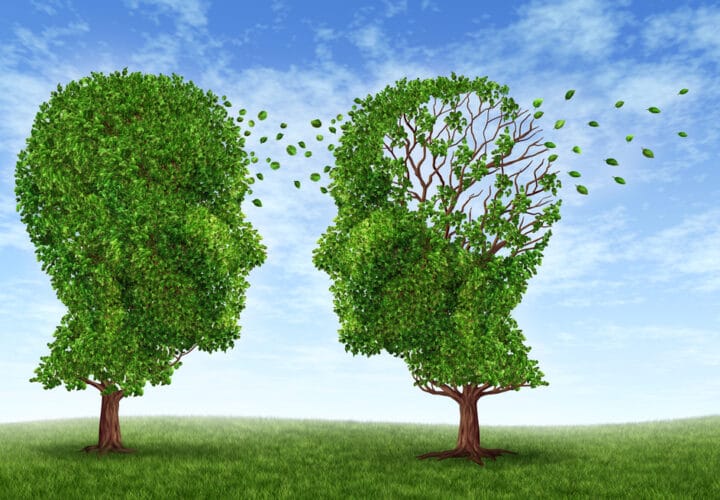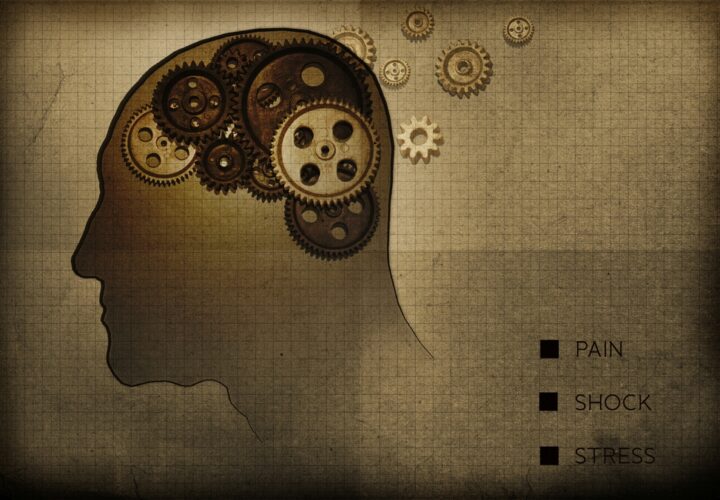The effects of chronic stress on the brain according to Daniela Kaufer of the Helen Wills Neuroscience Institute and UC Berkeley.
We’ve all felt the temporary effects of stress: a racing heart, sweaty palms, a sinking feeling in your stomach. For the most part, these symptoms go away once the trigger for stress is over. But what about chronic stress? Does stress keep our brains and body sharp, or is it slowly wearing them down?
What is stress? According to expert Daniela Kaufer from the Helen Wills Neuroscience Institute and the University of California, Berkeley, stress can be a healthy response to a perceived threat. But there is a fine line between feeling a small amount of stress, which can make your brain stronger, and going through traumatic events, a kind of stress that brings on conditions like post-traumatic stress disorder, or PTSD. The difference between the two has profoundly different long-term effects on the brain.
There is a lot of research on the impact of stress on aging and brain health, and we can extract some useful applications of dealing with stress from it. Being Patient spoke to Kaufer about her research on the effects of chronic stress on the brain. She discussed whether “good stress” exists, and how to measure whether high tension levels are affecting brain health. We also heard why we so often hear that people under an unhealthy amount of pressure are at a higher risk of Alzheimer’s.
Being Patient: Can you tell us about your research? How much does stress damage the brain?
Daniela Kaufer: We studied plasticity in the lab, which we usually think of as positive—how the brain adapts to things that are different in the environment. Changes in the environment might change the plasticity in our brain, including its structure and function. We have found that the question is a lot more complicated than figuring out what stress does.
From a young brain to a mature brain, there are different stages of vulnerability and the impact of stress. How we perceive stress also has an effect. For instance, how do we assess a situation where we feel stressed? Even when we look at rats, the way that they look at a situation may vary. Those stressors [including our perception of how stressful a situation is] become very damaging to the brain and to the areas of the brain that are susceptible, like the hippocampus—the brain’s memory center.
Sometimes when we’re assessing a situation, it can benefit our brain and help us deal with the next stressors that come along. Research has shown that some stress can be beneficial and change the structure and function of the hippocampus. Other research has shown how stress can be detrimental to memory function, causing anxiety and depression. We see that in the rodents we study. Right now, we are focused on something we call individual variation; even when you take a group of rats and they are almost genetically identical, when you expose them to stress, some of them develop anxiety symptoms and some don’t. We are looking at what mechanisms in the brain enable that, and the plasticity that involves myelin—the sheathing of neurons—a process that looks very different in the rats that develop anxiety versus the ones that don’t.
Being Patient: How could stress be good for the brain and how does this type of stress affect the hippocampus?
Daniela Kaufer: Something that’s important for the hippocampus and memory to function properly is the generation of new neurons. Most of us grew up in a world where we were told that we are born with a set of neurons that you’ll have for the rest of your life, and little by little, they die. However, that’s not always true. There are a couple of areas in the brain where that’s not accurate, and neurons are generated throughout those areas—a pool of stem cells creates new neurons.
And these neurons are very important for multiple things: specific memories, taxing memories, more complicated learning types and for your stress access. They play a role in regulating your stress and memory. You generate a lot of those neurons when you are young, and less and less when you are old. But throughout your life, you still generate those new neurons. However, chronic stress depresses that. Whenever you have chronic stress, you see a decrease in those neurons. But a little bit of stress—just the right amount—generates more neurons. Those neurons are then integrated into the circuitry and activate in your fear of learning in a way that buffers you from the next stressor that comes along.
Being Patient: Your findings indicate that a little bit of stress is good for us, but can chronic stress cause long-term damage?
Daniela Kaufer: Yes. In another study, we looked at social function. We gave the same stressor, in the same amount, to rats. Rats don’t like to be held in place, so if you hold them in place in a little bag, that’s an acute stressor—a type of stress that arises from a specific event. We paired that stressor with a smell; in one situation, we paired the stressor with a natural mint smell, and in the other, fox urine. The mint smell in the bag was a moderate stressor, while the fox urine smell was a much more severe stressor. Physically, being held in place for three hours is exactly the same thing, but those experiencing the mint smell knew they simply couldn’t move, whereas those who could smell the fox urine thought they’d be unable to run away from a predator. Both situations cause acute stress, or acute trauma, but in the mint experiment, the rats became much more friendly and cuddled with each other after being contained, while in the fox urine experiment, the rats were much more aggressive and socially withdrawn, because the trauma caused a more intense stress level.
Being Patient: How do you know what the right amount of stress we can endure is?
Daniela Kaufer: Nobody can tell you because it’s different for everybody. In a genetically identical population of animals who grew up in the same animal facility, where everything else in their lives was the same, there was still variability. The amount of licking and grooming that you get from your mother varies. If we look at a population, they would have a different amount of licking and grooming. That changes your hippocampus in a way that makes you have different stress responses than others throughout the rest of your life. Something that’s stressful for one person may not be stressful for another person, and there isn’t a way to measure that.
However, a researcher at UCSF was looking at a caregiver group versus a non-caregiver group and whether there were markers of stress in their blood. They looked at the ends of their chromosomes—specifically the telomeres—which determine how you age: the shorter those are, the more aged your cells are. There was a beautiful correlation of age with caregiving: The longer you were a caregiver, the shorter your telomeres were. However, what was really interesting was that when they looked for an exact correlation, including hormone levels or length of being a caregiver, the best predictor of stress was their self-report on how stressed they were.
Being Patient: So there’s a correlation between how aware you are of your stress and how much damage stress has on you?
Daniela Kaufer: There is a wonderful TED Talk called “How to make stress your friend” by Kelly McGonigal from Stanford, and she describes a bigger epidemiological study. In the study, they discovered that if you said stress is something that’s detrimental for your health, you are in the worst position. It’s not stress that makes you sick; it’s knowing stress will make you sick. At the end of the day, it’s about the appraisal, and dealing with the situation. I think if you feel very stressed, then it’s probably how your body reacts to it, but in a very physiological way. There are a lot of things that people have shown that alleviate stress, including physical exercise, meditation, mindfulness activities and changing the appraisal of the situation.
Being Patient: Is there a non-medical test to measure stress?
Daniela Kaufer: There are questionnaires, which work as well, if not better than the medical tests. The medical tests often look at the amount of cortisol in your blood, which is not a good predictor. Cortisol comes at the end of a secretion of hormones, and we all thought about it as the biological measure of how stressed you are. However, researchers learned that with chronic stress, and with depression, you actually have less of that hormone in your blood. And some of the worst PTSD cases are the ones who don’t have high levels of this hormone. So those stress questionnaires are the best way to assess one’s stress.
Being Patient: Do you think people should take medicine to control their stress levels?
Daniela Kaufer: Medication hasn’t been very successful in reducing a stress response. Antidepressants are very helpful for depression, but not necessarily the stress response. With PTSD, which is the biggest biological outcome of exposure to trauma, the medication approach never worked well. Medication is not really an option anymore. EDMR, the training of eye movement as the patient accounts the trauma, is very successful, but we don’t have a biological explanation for that. Also, mindfulness-based stress reduction techniques seem to be successful and virtual reality (reliving the trauma), but not medication.
Being Patient: Why do we often hear that stress will impact our chances of getting Alzheimer’s?
Daniela Kaufer: An earlier false belief was that stress increases the number of cells that are dying in your brain. However, stress itself does not kill brain cells. Those cells become more vulnerable to secondary hits. So when something else besides stress comes along, those cells are much more vulnerable, and are more likely to die. When a toxic protein aggregates, like you would see in a neurocognitive disorder like Alzheimer’s, and that comes on top of a stressed brain, the cells are more susceptible. It can exacerbate the damage you can get from a neurocognitive disorder. It makes us more susceptible to damage from other conditions. So it doesn’t make you more likely to develop Alzheimer’s, but if you have Alzheimer’s and the brain is very stressed, then those cells are more likely to die.
This interview has been edited for length and clarity.


